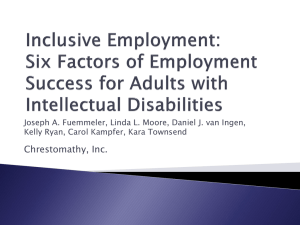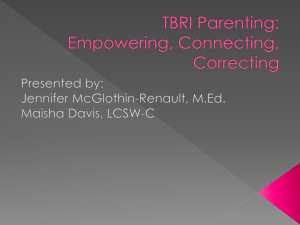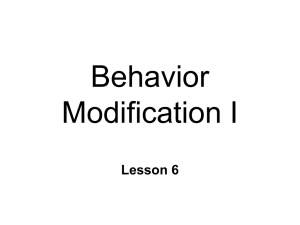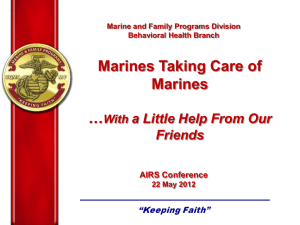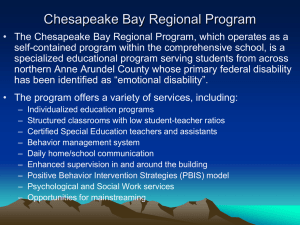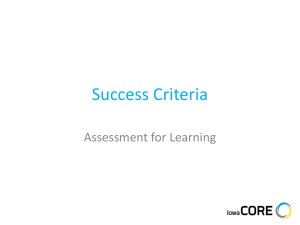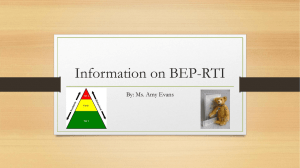MF Mission and Vision - Behavioral Health Information Network
advertisement
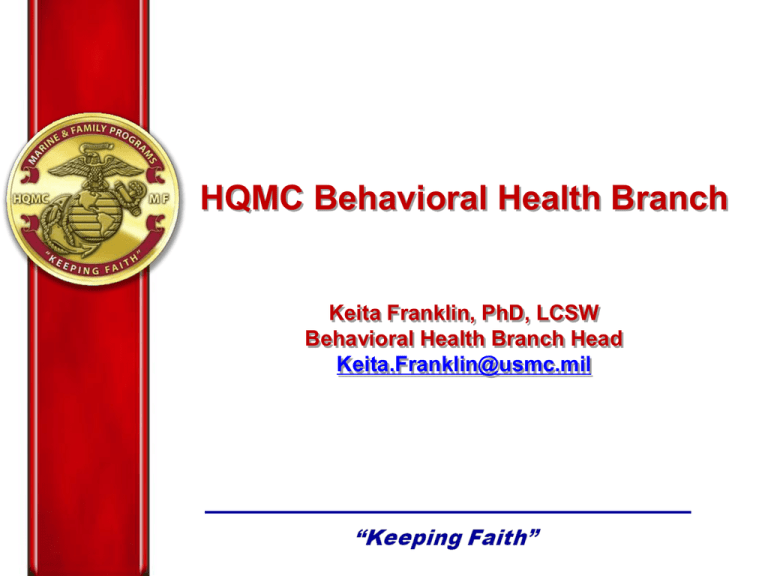
HQMC Behavioral Health Branch Keita Franklin, PhD, LCSW Behavioral Health Branch Head Keita.Franklin@usmc.mil MF Mission and Vision Mission “Keeping faith with our Marines and their families.” Vision Highly resilient, program savvy Marines and Families, robustly equipped with the services and tools they need to meet an era of persistent conflict as well as the challenges of day-to-day life in the 21st Century; especially during transition periods associated with mission, life and career events. MF Tenets Do the right thing. In all that we do, we are professionals and our service shall be characterized by the highest standards of professional ethics. Live within our means. Every dollar spent must result in superior program support and measurable effectiveness. Transparency. Our actions are focused and attentive but open to question, inspection, or audit and cooperation, collaboration and sharing is highly encouraged. Strengthen relationships. Wounded Warrior Regiment, Marine Corps Community Services, and Marine and Family Programs depend on the organizational strengths and contributions of many agencies. Marines and their families are served best by full partnerships. Background USMC Suicides Family Violence DUI 1,800 1,600 1,400 1,200 1,000 Sexual Assaults 800 600 400 200 0 2005 Positive Urinalysis 2006 2007 2008 2009 Child Maltreatment CPG, Priority #4 Task – Integrate Behavioral Health Efforts Five Behavioral Health Programs include; Family Advocacy, Sexual Assault Prevention and Response, Combat Operational Stress Control, Substance Abuse and Suicide Prevention Stove-piped Programs – Old Way Coordination Integrated Behavioral Health Programs – New Way Priority #4 Task - Integrate BH efforts Programs Program integration, allocation of resources, strategic planning, and communication with commanders Inputs Suicide Prevention Substance Abuse Prev Strategic Planning and Communication Unified Policy Family Advocacy Sexual Assault Reporting and Prevention Combat and Operational Stress Control Outputs • Universal Training • Family Advocacy IDC Rollout • Marine Resiliency Study • Peer to Peer Training Common Vision • Never Leave a Marine Behind Funding • OSCAR Evidence Based Practices • Take a Stand Integrated Behavioral Health Programs – New Way Priority #4 Task - Integrate BH efforts Program integration, allocation of resources, strategic planning, and communication with commanders Outcomes: • Better Support to the Commander • Coordinated training requirements •Eliminated redundancies •Uncovered gaps •Validated practices •Operational efficiencies Other BH Initiatives • Free educational tools and products for Marines and families • Standardizes behavioral health messaging • Conveys back to stakeholders what information is important to whom • Currently over 80K materials distributed •Additional Behavioral Health materials forthcoming • An evaluation of the BHIN found: • 85% of the participants indicated that the BHIN website was extremely useful in meeting their COSC needs • 40% ordered materials for themselves • 32% ordered information for their command/workplace • 28% ordered for fellow Marines Realities – Resources/Funding – Staffing – Updating and Timely Policy – Operational Tempo – Mission creep into other HQMC programs and activities Way-Forward Establish Behavioral Health Program (BHP) and Structure. The Marine Corps BHP and structure will be created to serve as a single point of advocacy to meet the dynamically changing and complex needs of Marines and their families. Hire and Grow a Ready Workforce. Offering staff a continuum of opportunities for training and knowledge development is a critical component for the future behavioral health capabilities of the Corps. Establish Program Oversight, Accountability and Transparency. The BHP will be accountable to Marine Corps leadership and the needs of Marines and their families. Way-Forward Adopt, Implement and Sustain Evidence Practices. Evidence based approaches build trust with commanders by ensuring Marines and their families are offered the most up-to-date, empirically supported prevention and treatment practices available. Implement the Institute of Medicine Mental (IOM) Health Intervention Spectrum for Mental Health Disorders. The IOM Mental Health Intervention Spectrum for Mental Health Disorders provides an appropriate framework for integrating behavioral health elements, as it complements the current Marine Corps Stress Continuum. Program Structure Establish Behavioral Health Program (BHP) and Structure. The Marine Corps BHP and structure will be created to serve as a single point of advocacy to meet the dynamically changing and complex needs of Marines and their families. – – – – Staffing issues OCO until shifted into baseline On-going analysis – documented needs HQ staffing models that reinforce full complement of services for the field and higher HQ – Installation staffing models that are scalable and on par with the needs of clients 12 Workforce Hire and Grow a Ready Workforce. Offering staff a continuum of opportunities for training and knowledge development is a critical component for the future behavioral health capabilities of the Corps. – – – – – – – – – Efforts well underway Training Needs Assessment Informal inquiry and dialogue Cognitive Processing Therapy Parent-Child-Interaction Therapy PRIME Training COSC/Suicide/SAPR/FAP Conference Trauma Informed Care Victim Conference 13 Program Efforts Establish Program Oversight, Accountability and Transparency. The BHP will be accountable to Marine Corps leadership and the needs of Marines and their families. Early efforts include: - Improved Accreditation Processes - Policy – MF Newsletter – Weekly updates – Share point – VTC’s – OPT’s – BHAC 14 Evidence Based Practice Adopt, Implement and Sustain Evidence Practices. Evidence based approaches build trust with commanders by ensuring Marines and their families are offered the most up-to-date, empirically supported prevention and treatment practices available. – Begins with IOM model – IDC Case Review processes – Peer-to-Peer Models • NLMB • Take a Stand – PCIT – OSCAR – FAP Prevention Curriculums 15 Future Operations – IOM Health Intervention Spectrum for Mental Health Disorders Continuum – Behavioral Health Advisory Committee (BHAC) – Research / Program Evaluation – Behavioral Health Conferences – Behavioral Health Case Management System – Universal Training Prevention Continuum An Evidence Based Framework…. BUMED USMC and BUMED USMC STRESS CONTINUUM READY REACTING INJURED ILL Behavioral Health Advisory Committee PURPOSE • Advise MF on behavioral health programs and initiatives • Focus on; • gaps, •duplication of effort, •best practices in research and application VOTING MEMBERS • Dir, MF (chair) • TMO (vice chair) • Chaplain of the Marine Corps • Exec Dep, TECOM • MARFORCOM (Col) • MARFORPAC (Col) • MEFs (Col) • MFR (Col) • Dir, SD (Col) • SgtMaj, MF EX OFFICIO • BH Branch Hd • MF Counsel • DCOE • NHRC • Recorder Behavioral Health Advisory Committee ACTIONS • Synchronize / integrate behavioral health efforts • Review / develop / ID research & future operations requirements • Propose opportunities for coordinated education / training efforts • Examine requirements for sustainment • Address ‘confidentiality vs. engaged leadership’ • Address stigma issues • Clarify consequences of seeking mental health care • Share outcomes across systems METHODOLOGY • Four meetings / year • Meeting minutes reported to Executive Force Preservation Board Future Operations – Behavioral Health Conferences • focus on improving services to Marines and their families • sharing of evidence-based practices • improve integration efforts – Behavioral Health Case Management System • • • • executive leadership support will share information (when appropriate) between programs will assist integration efforts hiring an IT specialist to assist – Universal Training • based on IOM model • based on the successes of Never Leave a Marine Behind, OSCAR and Take a Stand training • signed contract in Sept 11 Point of Contact Keita Franklin, PhD, LCSW Behavioral Health Branch Head Keita.Franklin@usmc.mil
